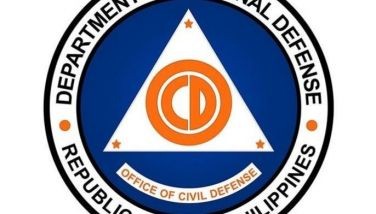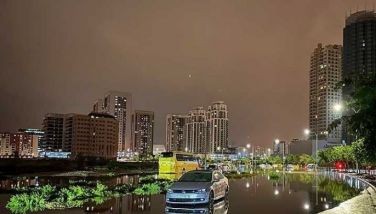Rody to ask China: Do you want to control SCS?
After Chinese protest, Rody stops Pag-asa construction
MANILA, Philippines — Ahead of possible talks with Chinese President Xi Jinping in Vietnam, President Duterte said yesterday he wants to know straight from Beijing if it intends to control the South China Sea.
“I do not take it against China. But what are the stakes? Do you want control of the passage?” Duterte said at his pre-departure briefing at the Ninoy Aquino International Airport (NAIA) before leaving for Da Nang in Vietnam to attend the Asia-Pacific Economic Cooperation (APEC) summit.
He is expected to meet Xi for bilateral talks on the sidelines of the APEC summit.
On Tuesday, the President promised to be “frank” with China in discussing the dispute over the South China Sea, through which $5 trillion of world trade passes.
Duterte said China should be clear about its plans as these could have an impact on the Philippines and on the region in general.
“We are friends with China. May utang na loob tayo (We have a debt of gratitude). At one moment in our life or the lives of the Filipinos, they were there to give us the arms when we had none and we were fighting it out in Marawi,” the President told a press briefing at the NAIA Terminal 2.
“But let us be clear on what we intend to do here because eventually it will affect the entire Philippine archipelago,” he added.
Duterte stressed assistance or pledges of aid should not be used as “bargaining chips” on matters related to the greater interest of the Philippines and the rest of Southeast Asia.
“It’s about time that ASEAN (Association of Southeast Asian Nations) countries, not really to confront, but to make clear to us what China really wants,” the President said.
Duterte said he wants those questions answered “for the sake of my country and the others who have overlapping claims.”
But the President made it clear it might not be wise to confront China over the maritime row.
“The truth is, if I could only confront China or if it is China alone – that’s the problem. But I said, there are contesting countries which have overlapping jurisdictions,” the President said.
“And if I engage China now, I will have to engage the five others. It would be something like a scramble there because if China concedes to one, Philippines, it has to concede to the others,” he pointed out.
“And what will now happen to our general claim of being the economic zone belonging to my country? That’s a problem,” he added.
Duterte, nevertheless, expressed belief the topic should be raised in bilateral meetings or at a regional forum.
“I should be bringing this important matter to the surface,” the President said.
China claims virtually the entire South China Sea while the Philippines, Vietnam, Malaysia, Brunei and Taiwan have overlapping claims.
A misstep, he stressed, could be disastrous to the region. “I know where (it’s) going, the direction and it’s a game of geopolitics. I said, it would change the entire landscape of Southeast Asia if something goes wrong,” he said.
Duterte had said he would not declare war over the territorial issue as it would result in a “massacre” of Filipino troops.
He said he is counting on the promise of China that it would not build structures in the Philippine-occupied Pag-asa Island and Panatag (Scarborough) Shoal.
“I just hope that he (Chinese President Xi) would honor it because it will change the entire geography of the world. And war starts. I don’t know what will be the next geographical division of Asia,” the President said on Tuesday.
‘Don’t disturb equilibrium’
Duterte said Chinese offi- cials can always visit Pag-asa island in Palawan as long as they do not “disturb the equilibrium” there.
“I said, ‘You can go there for a visit.’ As a matter of fact, you can shake hands with the commander there,” the Presi- dent said.
“I will tell my military men to treat you to a lunch .. But do not do anything that will disturb the equilibrium now present there,” he added.
China recently unveiled what it described as a “magic island-maker” vessel, triggering speculations that it would be used to reclaim Panatag Shoal.
A China Daily report said the 140-meter long vessel Taikun can dredge as much as 6,000 cubic meters of sand or clay per hour from 35 meters below the water’s surface.
Construction stopped
Apparently in keeping with his stand not to intimidate China, President Duterte had ordered the Armed Forces of the Philippines (AFP) to stop its construction of a fishermen’s shelter on Sandy Cay near Pag-asa island in the disputed Spratlys archipelago, Defense Secretary Delfin Lorenzana bared yesterday.
The instruction was issued in August, he said.
Located just 2.5 nautical miles off Pag-asa, Sandy Cay is within the island’s maritime domain but is some 10 nautical miles from Beijing’s man-made island over Zamora (Subi) Reef.
“I agree with the decision because it’s a new feature,” Lorenzana said, adding the President’s instruction was based on explanations made by Foreign Affairs Secretary Alan Peter Cayetano on the issue, following China’s filing of a diplomatic protest.
Lorenzana made the disclosure in an interview on the sidelines of a conference on security dubbed “Protecting the ASEAN community from Evolving Political-Security Challenges” at the Makati Shangri-La hotel.
The decision to stop construction of the fisherman’s shelter, the defense chief said, was in accordance with the agreement among all claimants that they maintain the status quo and refrain from occupying new features in the disputed waters.
Pag-asa residents and even troops usually visit Sandy Cay to have a picnic, do some fishing or adventure diving.
During his visit to the Western Command (Wescom) in Palawan in April, Duterte ordered the troops to occupy and even fortify uninhabited islets or islands in the West Philippine Sea.
“It looks like everybody is making a grab for the islands there, so we better live on those that are still vacant,” the President told the Wescom troops.
He was also quoted as telling the troops: “At least let us get what is ours and make a strong point there that is ours.”
“We brought people there to occupy, to put structure for our fishermen,” Lorenzana said.
Apparently after discovering the building activities, China lodged a diplomatic protest, citing the Declaration of Conduct (DOC) among the claimant states.
Cayetano, the defense chief said, saw the protest as valid.
“Wala na tayong tao doon (We don’t have people there),” Lorenzana said, referring to Sandy Cay, around which Chinese ships now regularly operate.
The Philippines has troops deployed in seven islets and two reefs in the disputed archipelago, while Vietnam has more than 23 outposts, and Beijing, seven. Malaysia has three and Taiwan has one. Only Brunei, another claimant, has no military presence in the area.
ASEAN ‘adrift’
Meanwhile, former foreign affairs secretary Albert del Rosario said ASEAN is “adrift” due to lack of unity and leadership and is at risk of becoming a bystander oblivious to developments in the region.
“The bright promise of Southeast Asia’s future contrasts against the fog of the present,” Del Rosario said at a forum in Makati City.
“In the midst of many changes in our environment, many of our states have found themselves being pulled in different directions. This has been worsened by a lack of leadership from among us. In broader context, one can say that ASEAN is adrift,” Del Rosario said.
He said the bloc’s “over-abundance of caution” might make it irrelevant. ASEAN, he said, is striving to be a rules-based community, to strengthen its centrality and to more actively contribute to the stability of the Asia-Pacific. “As an institution, it provides a platform for us to present and reconcile our interests and manage our differences.
“If ASEAN pursues an over-abundance of caution, it risks becoming only a bystander to the events within its own region,” he stressed.
He said recent developments are of grave concern and need a firm and principled response from ASEAN and the rest of the international community. He cited the Korean issue apart from South China Sea tensions.
“The resolution of these matters will require the full strength of our cooperative abilities, not our coercive ones,” he pointed out.
Del Rosario also said the US banner of promoting the rule of international law and the “Asia Pivot” was “unfortunately, not a focused one.” – Jaime Laude, Pia Lee-Brago
- Latest
- Trending




























